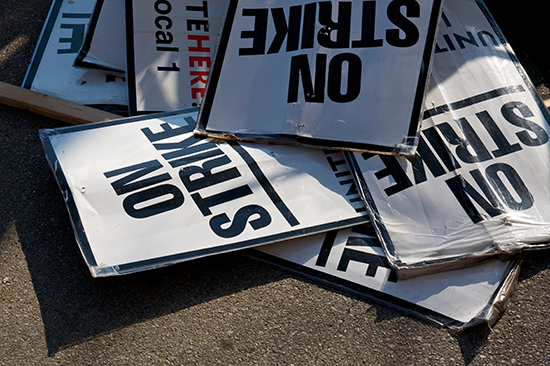

News
Labour Relations
B.C. labour board rules workers can’t refuse to cross some picket lines
 (jekershner7/Getty Images)
(jekershner7/Getty Images) By Zak Vescera, The Tyee
A strike that paralyzed one of Canada’s largest shipyards was illegal, B.C.’s Labour Relations Board has ruled, setting a new precedent for future disputes.
The ruling, reversing an earlier decision, found other unions broke the law when they refused to cross picket lines at Seaspan’s North Vancouver shipyard last fall in solidarity with striking tugboat operators represented by the Canadian Merchant Services Guild.
That strike ended in October, and the guild has since ratified a new collective agreement including significant boosts to pay, improved safety regulations and plans to cancel a new scheduling system.
Applies only to certain disputes
The LRB did not issue any new penalties to the unions who took part in the strike. But labour lawyers say the board’s decision could have implications for future disputes where federally and provincially regulated workers overlap.
“This is an important decision although it will have applicability to only certain disputes — where there is a federal picket line and a provincially certified unit balking at crossing,” York University law professor Sara Slinn said in an email.
About 120,000 workers in B.C. are in federally regulated sectors like banks, air, rail and marine transportation, telecommunications and broadcasting.
The guild went on strike in late August after years of failed bargaining with Seaspan, a maritime giant and one of a group of companies owned by American business magnate Dennis Washington.
Records filed in the B.C. Supreme Court show the company had been preparing for a possible strike for months and had tried to encourage other unionized employees to cross the guild’s picket line.
In June, a Seaspan executive wrote to a spokesman for other unions asking for their assurance that employees would come to work in the event of a strike. In August, after the guild issued strike notice, company president Ian McIver wrote workers directly, telling them they were expected to come into work.
But they refused, and 900 other union workers joined the guild on the picket line, stopping work on multibillion shipbuilding projects and ratcheting up pressure on Seaspan.
That labour action was possible because of a special provision in B.C.’s Labour Relations Code allowing workers to refuse to cross a picket line.
Original ruling reversed
The Labour Relations Board originally ruled in the unions’ favour. In a September decision, they declared unions had a right to not cross that picket line as a mark of solidarity. But on Dec. 30, more than two months after the strike ended, the board reversed its decision. It determined that since tugboat operators work under the federal labour code, the provincial rules on picketing did not apply.
With the exception of one union, whose members were protected by a separate clause, the board found the refusal of the other unions and their members to cross the guild’s picket line “constituted an illegal strike,” the decision says.
Walter Gerlach, a spokesperson for a group of unions working at the Vancouver Shipyards, declined to comment further.
Ruling restores ‘measure of industrial stability’: Company
Ali Hounsell, the company’s director of communications, celebrated the win as restoring “a measure of industrial stability.”
“The decision ensures that provincial employees who are not on strike will not have to lose pay due to federal picket lines, as Seaspan experienced with the CMSG strike last fall,” she wrote.
It is relatively rare for workers regulated by the federal labour code to share a workspace with employees whose jobs are regulated under provincial law.
But in spaces where it does happen — like the docks — Slinn says the board’s decision will carry weight. “For those employers and unions this will be important,” she wrote.
The guild, which did which did not respond to a request for comment, has not publicly released the terms of the new agreement. But a copy obtained by The Tyee shows the employer backed down on proposals to remove engineers represented by the union from certain Seaspan boats.
The union also won substantially higher salaries for workers, including a 5.7-per-cent pay hike in 2022, significantly higher than the final offer McIver presented to workers before the strike began.
Print this page
